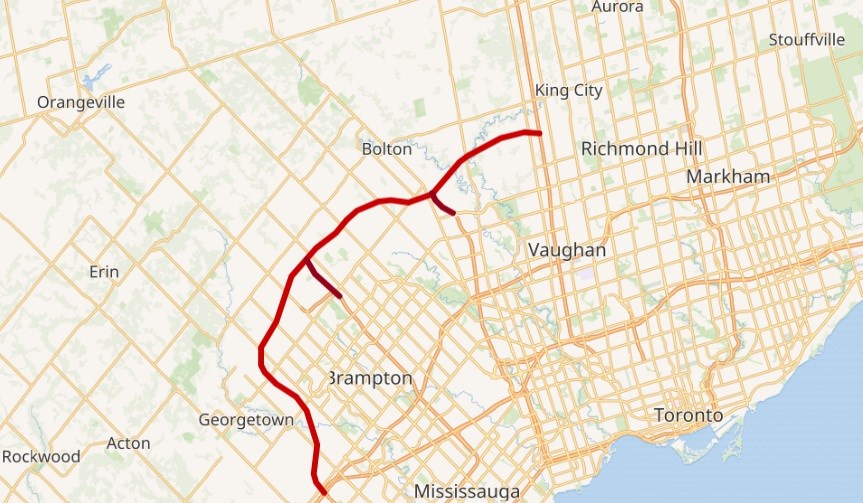Ottawa is ending its environmental assessment of Highway 413, clearing the way for a key Tory campaign promise and bringing to an end a bitter dispute between the Ford and Trudeau governments.
On Wednesday, the two governments submitted a joint consent order to Federal Court to end the impact assessment process, which the feds first launched in May 2021.
"Ontario and Canada have mutually agreed to resolve this litigation and have asked the Federal Court to issue a consent judgment. As this matter is before the court, it would be inappropriate to comment further at this time," Ontario Transportation Minister Prabmeet Sarkaria's spokesperson, Dakota Brasier, said in a statement.
The federal Impact Assessment Agency sent the exact same statement.
In October, the Supreme Court found that much of the federal government's Impact Assessment Act — which it was using to probe Highway 413 — was an unconstitutional overreach into provincial affairs. Ottawa has said it will amend the act. After the ruling, Ontario launched another court challenge of the assessment law.
The draft order agreed upon by both sides says that the agreement includes some kind of environmental assessment of the project.
"Ontario and Canada are committed to collaborating on the assessment of effects within areas of federal jurisdiction in relation to Highway 413," it says.
Environmental advocates and opposition MPPs said they were disappointed in the feds.
"How about anger?" Environmental Defence Executive Director Tim Gray said when asked for his reaction. His group called the decision "a gross abandonment of federal responsibility," arguing the federal government is violating its obligations to protect waterways, Indigenous sites and at-risk animals. It called the highway itself "the bulldozer front of farm-eating, nature-killing, climate-warming, developer-enriching sprawl that would cost Ontarians billions."
“Just as the provincial government’s attack on the broader Greenbelt was never about building housing, the proposed Highway 413 is not about addressing traffic congestion. It is simply a $10-billion taxpayer subsidy for the sprawl schemes of well-connected developers,” Gray said.
Ottawa shouldn't have rolled over before implementing its new impact assessment act, which could come in the April 16 budget, he said.
"I think the federal government needs to explain themselves," Gray said.
Liberal Leader Bonnie Crombie said she still opposes the project despite her federal cousins capitulating.
"As Mayor of Mississauga, I was one of the first to oppose Doug Ford's wasteful Highway 413," she said in a statement. "Instead of charging households an average of $2,000 for a highway designed to benefit Doug Ford's wealthy insiders, the Conservatives should invest in fixing our healthcare system and in our children's education."
NDP environment critic Sandy Shaw called the decision "completely irresponsible."
"At a time when Ford has systematically stripped away countless meaningful environmental protections, a federal impact assessment may be the only way to find out the true cost of the Highway 413 proposal – including the impact to farms, floodplains, and vulnerable species," she said in a statement.
"We're hoping that the federal government doesn't abandon their responsibility to protect endangered species," Green Leader Mike Schreiner said, adding that he'll continue to oppose the project no matter what.
After the Greenbelt scandal, Highway 413 became the prime target of Ontario environmentalists' ire. The planned highway, which could expand to 10 lanes by 2041, would stretch 59 kilometres and connect Highway 400 just north of Vaughan to the Highway 401/407 interchange at the edge of Mississauga.
It would stretch across York, Peel and Halton Regions, including dozens of water crossings and 163 hectares of the Greenbelt. Almost 30 per cent of the highway would cross agricultural or other environmentally designated lands, Ontario's Transportation Ministry has said.
The project would also be a boon to developers with land nearby. Many of those who had their Greenbelt land rezoned for development had cited Highway 413 as a reason protections should be removed.
Ontario hasn't said what the highway will cost, but some estimates peg it at $10 billion. Schreiner said it "makes absolutely no sense" to spend that money when the government could instead remove tolls for truckers on Highway 407 to open up space on the other 400-series routes.
Ecojustice lawyer Laura Bowman said in a release that the "federal government will be held accountable if it does not enforce its laws." She told The Trillium she was speaking to political consequences and not hinting at an Ecojustice legal challenge.
With the feds stepping aside, opponents' only hope appears to be people power.
"I think it just underscores the need for the public to really both put pressure on their federal officials to ensure that proper oversight is put back in place by the federal government," Gray said. "And also on the provincial government itself to cancel this highway."




